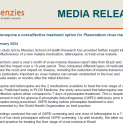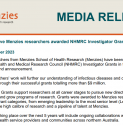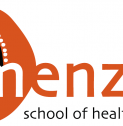Associate Professor Angela Devine
Principal Research Fellow
Qualifications:
PhD, The Open University, 2018; Master of Science, London School of Hygiene and Tropical Medicine, 2008; Bachelor of Science, University of Evansville, 2006
Approved level of HDR supervision at Charles Darwin University:
Principal supervisor
Location:
Biography:
Angela Devine is a health economist with over 15 years of experience in the economic evaluation and costs related to the management of infectious diseases. She is an NHMRC Emerging Leadership Fellow.
She leads the Health Economics Group at Menzies and is a Global Gender Equality in Health Leadership Committee Member for Women in Global Health (WGH) Australia. Since joining Menzies in 2018, she has helped to secure over $27 million in competitive grant funding, including an NHMRC Ideas grant on multi-species malaria modelling as CIA.
A/Prof Devine’s current research is focused on the cost-effectiveness of options for the management of vivax malaria. Additional projects in global health extend from malaria to HIV, tuberculosis, hepatitis B, antimicrobial resistance, and dengue. Methodological research interests include the joint costs and consequences of co-infections, the valuation of productivity losses in low- and middle-income countries, and the development of online tools to address policy decisions. Available online tools can be found here and here.
In addition to her role at Menzies, A/Prof Devine also teaches in Menzies Postgraduate Public Health programs for Charles Darwin University and holds a position at The University of Melbourne, where she is part of the Malaria team in the Centre for Epidemiology and Biostatistics Research and Melbourne Health Economics in the Centre for Health Policy. In addition, she is an Academic Editor for PLOS Global Public Health.
Her ORCID profile can be found here.
Research Themes
- EFFORT clinical trial: Effectiveness of tafenoquine and primaquine
- Evaluating zoonotic malaria transmission and agricultural land use in Indonesia - ZOOMAL
- Stronger Health Systems for multidrug-resistant tuberculosis and malaria
- Fleming Fund Country Grant to Timor-Leste
- Multi-species malaria modelling to improve policy and decision making
- SAPOT Clinical Trial: Treatment in pregnancy to prevent malaria
- Hearing for Learning Initiative
-
MEDIA RELEASE | Menzies researchers RESPOND to priority diseases in our global neighbourhood
Menzies will lead a 4-year health system strengthening partnership in the Asia-Pacific region, under the Partnerships for a Healthy Region Initiative by the Australian Government.
-
MEDIA RELEASE | Is tafenoquine a cost-effective treatment option for Plasmodium vivax malaria?
Primaquine and tafenoquine are the 2 medications available to treat the liver stage of vivax malaria. The study uncovered that tafenoquine was a cost-effective option when compared to 7 days of primaquine treatment.
-
MEDIA RELEASE | Five Menzies researchers awarded NHMRC Investigator Grants
Five researchers from Menzies have been awarded NHMRC Investigator Grants in today’s funding round announcement, totaling more than $9 million.
-

Global costs of Plasmodium vivax malaria estimated for the first time.
A new study published in the open-access journal PLOS Medicine by Dr. Angela Devine at Menzies School of Health Research in Australia, and colleagues estimate the global economic burden of P. vivax for the first time using country-level data.
-

First study to estimate the global costs due to vivax malaria
The global cost of vivax malaria infections could be reduced substantially if radical cure is used more effectively, a new paper has found.
-
MEDIA RELEASE | First study to estimate the global costs due to vivax malaria
The global cost of vivax malaria infections could be reduced substantially if radical cure is used more effectively, a new paper has found.
-
New study shows faster way to cure vivax malaria
A large clinical trial in Africa and Asia has shown that a 7 day course of high dose primaquine, a drug used to treat P. vivax malaria, is well tolerated.
-
7th International Conference on Plasmodium vivax Research | Final Report
MESA Correspondents bring you cutting-edge coverage from the 7th International Conference on Plasmodium vivax Research (ICPVR 2019).
-
Coverage from the 7th International Conference on Plasmodium vivax Research
Wrapping up the 7th International Conference on Plasmodium vivax Research, day three focused on the topics of P. vivax drugs and approaches for P. vivax elimination.
- Price, D.J., Nekkab, N., Monteiro, W.M., Villela, D.A.M., Simpson, J.A., Lacerda, M.V.G., White, M., Devine, A. (2024) The cost-effectiveness of tafenoquine following G6PD screening for the treatment of vivax malaria in Brazil: a transmission model analysis. PLOS Medicine; 21(1): e1004255. doi: https://doi.org/10.1371/journal.pmed.1004255
- Walker, C.R., Hickson, R.I., Chang, E., Ngor, P., Sovannaroth, S., Simpson, J.A., Price, D.J., McCaw, J.M., Price, R.N., Flegg, J., Devine, A. (2023) A model for malaria treatment evaluation in the presence of multiple species. Epidemics; 44: 100687. doi: https://doi.org/10.1016/j.epidem.2023.100687
- Devine, A., Xiong, X., Gottlieb, S.L., Britto de Mello, M., Fairley, C.K., Ong, J.J. (2022) Health-related quality of life in individuals with genital herpes: a systematic review. Health Qual Life Outcomes; 20(1):25. doi: https://doi.org/10.1186/s12955-022-01934-w
- Akpan, E., Hossain, S.J., Devine, A., Braat, S., Hamadani, J.D., Pasricha, S.R., Carvalho, N. (2022) Cost-effectiveness of universal iron supplementation and iron-containing micronutrient powders for anaemia among young children in rural Bangladesh. Am J Clin Nutr, 116(5):1303–1313. doi: https://doi.org/10.1093/ajcn/nqac225
- Devine, A., Battle, K.E., Meagher, N., Howes, R.E., Dini, S., Gething, P., Simpson, J.A., Price, R.N., Lubell, Y. (2021). Global economic costs due to vivax malaria and the potential impact of its radical cure: A modelling study. PLoS Medicine, 18(6): e1003614. doi: https://doi.org/10.1371/journal.pmed.1003614
- Agius, P.A., Cutts, J.C., Oo, W.H., Thi, A., O'Flaherty, K., Aung, K.Z., Thu, H.K., Aung, P.P., Thein, M.M., Zaw, N.N., Htay, W.Y.M., Soe, A.P., Razook, Z., Barry, A.E., Htike, W, Devine, A,. Simpson, J.A., Crabb, B.S., Beeson, J.G., Pasricha, N., Fowkes, F.J.I. (2020). Evaluation of the effectiveness of topical repellent distributed by village health volunteer networks against Plasmodium spp. infection in Myanmar: a stepped-wedge cluster randomised trial. PLOS Medicine; 17(8): e1003177. doi: https://doi.org/10.1371/journal.pmed.1003177
- Devine, A., Pasaribu, A. P., Teferi, T., Pham, H. T., Awab, G. R., Contantia, F., . . . Lubell, Y. (2019). Provider and household costs of Plasmodium vivax malaria episodes: a multicountry comparative analysis of primary trial data. Bull World Health Organ, 97(12), 828-836. doi: https://doi.org/10.2471%2FBLT.18.226688
- Taylor, W. R. J., Thriemer, K., von Seidlein, L., Yuentrakul, P., Assawariyathipat, T., Assefa, A., . . . Price, R. N. (2019). Short-course primaquine for the radical cure of Plasmodium vivax malaria: a multicentre, randomised, placebo-controlled non-inferiority trial. Lancet, 394(10202), 929-938. doi: https://doi.org/10.1016/S0140-6736(19)31285-1
- Devine, A., Parmiter, M., Chu, C. S., Bancone, G., Nosten, F., Price, R. N., . . . Yeung, S. (2017). Using G6PD tests to enable the safe treatment of Plasmodium vivax infections with primaquine on the Thailand-Myanmar border: A cost-effectiveness analysis. PLOS Negl Trop Dis, 11(5), e0005602. doi: https://doi.org/10.1371/journal.pntd.0005602
- Drake, T. L., Devine, A., Yeung, S., Day, N. P., White, L. J., & Lubell, Y. (2016). Dynamic Transmission Economic Evaluation of Infectious Disease Interventions in Low- and Middle-Income Countries: A Systematic Literature Review. Health Econ, 25 Suppl 1, 124-139. doi: https://doi.org/10.1002/hec.3303







